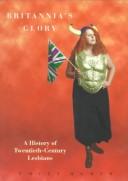There are a lot of used bookstores around Boston that have $1 book carts, thus giving rise to that special category of "books one wouldn't have bothered to acquire except they were $1 so why not?" Emily Hamer's Britannia's Glory: A History of Twentieth-Century Lesbians (Cassell, 1996). Not that I lack an interest in the history of English lesbians. In fact, one of my first thoughts skimming the table of contents was, "Oh good! A whole chapter on World War I -- I'll be able to do research for my Downton Abbey fan fiction!" (KarraCrow: "You realize you're unwell, right?). But this isn't the book I'd pick up to do serious historical research. Still, for a dollar? I was totally willing to pick it up for reading on the T this week.
Hamer, whose scholarly background is in philosophy, politics, and economics (Oxford), has written a very readable survey of women's passionate relationships in twentieth-century Britain. I thoroughly enjoyed the chatty, anecdotal chapters that focused on specific women -- famous and not-so-famous alike -- in each period between the suffrage movement and the 1980s. Given that my own knowledge of lesbian activism is U.S.-centric, I appreciated seeing the same period through a slightly different lens, and learning about some new names and publications, particularly in the 1950s-70s, that I know I'll be looking into with more serious historical interest.
The most frustrating thing about the text -- although I wasn't even very irritated, just puzzled by it -- was Hamer's insistence on understanding women's relationships through her own present-day lens of what lesbian relationships looked like, and how lesbian identity is constituted. There has been a long-standing debate in the history of sexuality field about how we understand sexual identities in periods not-our-own. There's a school of thought that sets about "resurrecting" lesbian and gay individuals from the past, on the assumption that such identities (being innate) have always existed, and we can simply uncover what previous historians have overlooked or deliberately denied. I understand this impulse, but as an historian it makes me twitchy: I believe that sexual desires are of our bodies (and therefore to some extent 'ahistorical,' though even that breaks down on some level), but are also inevitably shaped by the historical context in which we live. Thus, to breezily describe women in same-sex relationships as leading "lesbian lives," or someone from the 1910s as being a "butch dyke" is to apply identities from our own repertoire on people who may have performed such roles with a very different self-conception.
Hamer acknowledges this debate, yet ultimately falls back on an ahistorical interpretation, writing, "It is argued that only those women who thought of themselves as lesbians were lesbians. However, this does just [sic] seem wrong: being a lesbian is a theoretically observable aspect of life ... One is a lesbian if the life one lives is a lesbian life" (10). On the one hand, I understand that Hamer is pushing back against people who are reluctant to accept -- without word-for-word proof -- that any same-sex relationships existed before the sexual revolution. Her argument that we hold same-sex relationships to a higher standard of proof than heterosexual relationships is a valid one. At the same time, "lesbian" as we understand the word today is bound by its historically-specific meanings and can't simply serve as a stand-in for "women who had sex with / sustained sexual relationships with other women." Which is how Hamer seems to wish to use it.
Further, her insistence on describing her (often extremely interesting!) historical subjects as "lesbians" leads her to erase or ignore the variability in their sexual desires and lived lives. For example, situating Vita Sackville-West as a "lesbian" leads her to minimize Sackville-West's marriage to Harold Nicolson as a sham, and suggest it was merely an attempt to maintain social respectability. The much more nuanced relationship Sackville-West describes in her own account becomes lost. Likewise, any possibility of women's sexual fluidity or bisexuality is elided. This is probably, in part, a problem of the period in which Britannia's Glory was conceived -- when sexual identities were still being policed at the boundaries to a greater extent than (it is my hope, anyway) we police them today.
I was, perhaps, spoiled by my recent reading of Emma Donoghue's Inseparable (review coming soon), in which Donoghue handles the identity problem quite simply: by focusing on the texture of passion in women's relationships, regardless of how they are named in a particular time and place. Such an approach steps away from our time-bound conceptions of what a woman who desires, and is sexually involved with, other women looks like or conceives of herself -- and focuses on the heart of the matter: the fact that she expressed her sexuality in some form or fashion with other women. For all or part of her life. To my mind, anyway, this is a much more expansive, enduring, and interesting way to study the people who came before us.


No comments:
Post a Comment